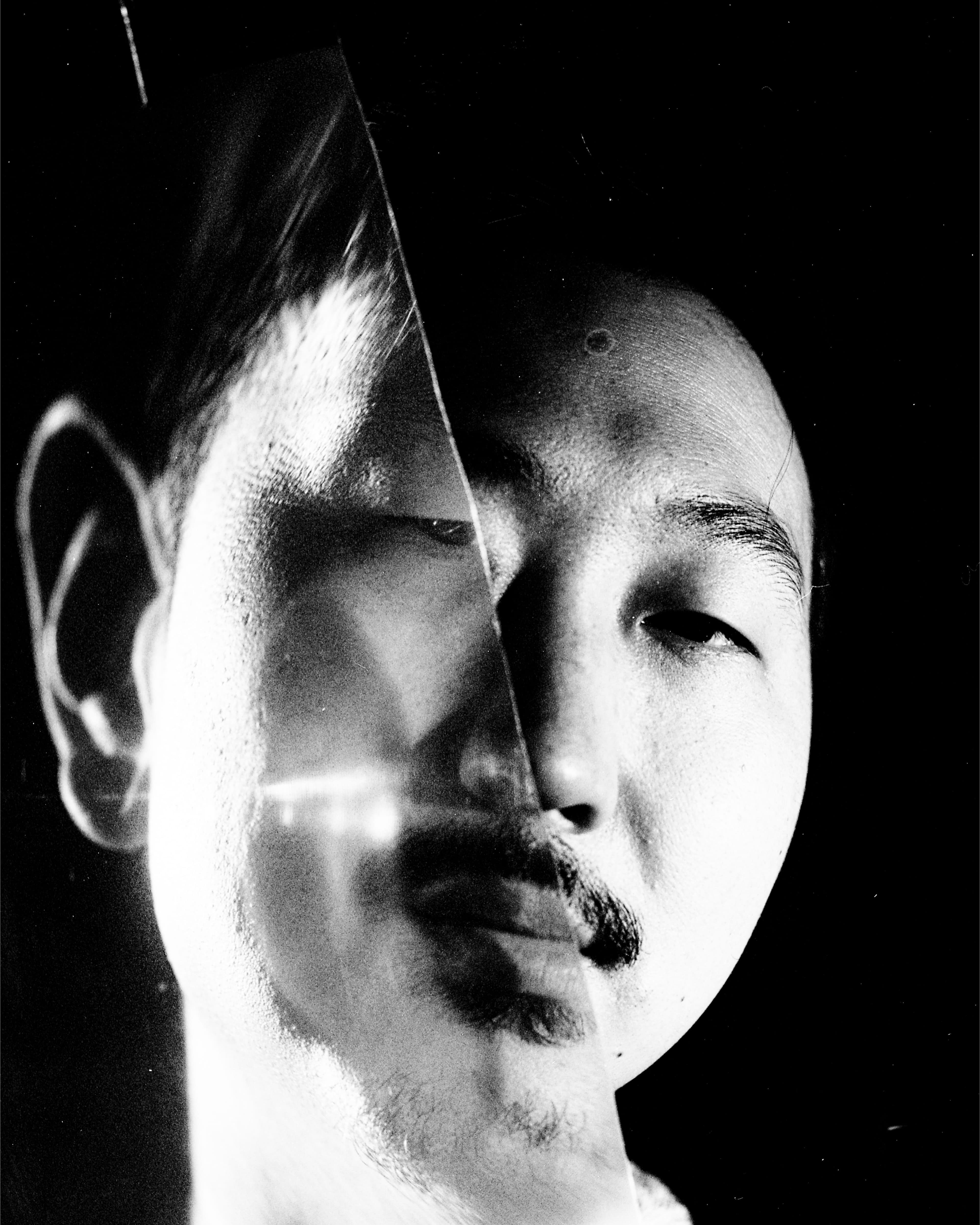
The Chosen Families of Andrew Ahn
When I spoke with filmmaker Andrew Ahn, it was the day after the Los Angeles premiere of his latest feature, The Wedding Banquet. I showed him the photos for this story, sharing that I thought he looked “so cool,” and he laughed. “It was very funny. The photographer said I have a friendly face, it makes things tricky,“ he said. There is truth in that statement—Ahn absolutely beams when he speaks. It’s a quality that reveals itself not just in his smile but in the sincerity when he talks about identity, love, and the care shown throughout his storytelling.
The Wedding Banquet is a reimagining of Ang Lee’s classic 1993 film, a comedy set in New York in which a gay, Taiwanese man attempts to satisfy his traditional, nagging parents via a marriage of convenience to a woman in need of a green card, while keeping his boyfriend a secret. The latest release is a reimaging of the story with some significant updates. There are now two queer couples involved—Min (Han Gi-chan), who wants to marry his boyfriend Chris (Bowen Yang) out of love, as well as for the opportunity to stay in America instead of being forced to return to Korea by his grandmother; and Lee (Lily Gladstone) and Angela (Kelly Marie Tran), who are struggling to conceive through IVF treatments. To continue the expensive fertility journey, Angela accepts Min’s proposal to fake a marriage in exchange for the funds to see it through. “I wanted this film to talk about building queer family through commitment and through having children,” says Ahn.
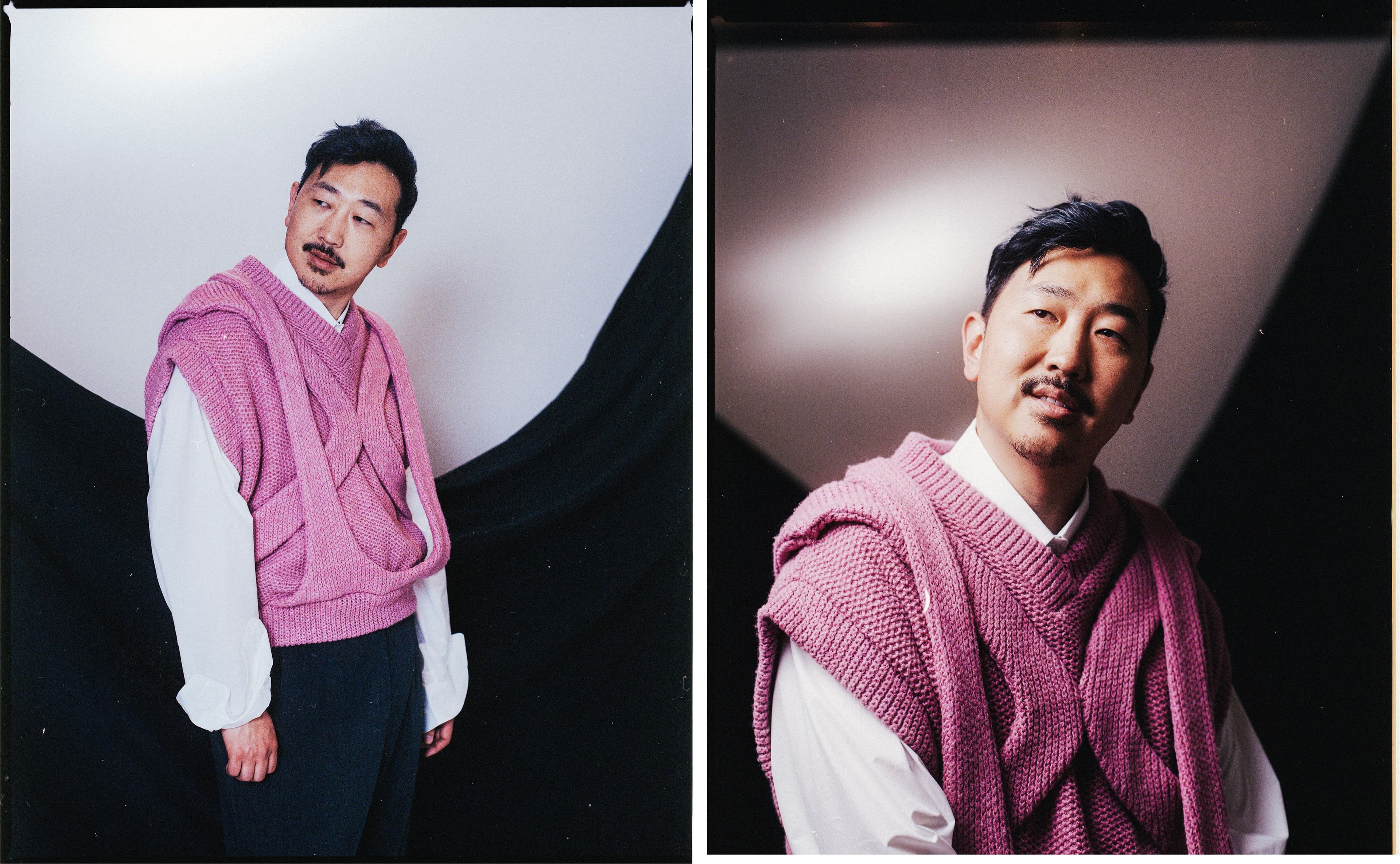
SWEATER by Clara Son. SHIRT by The Frankie Shop. Vintage PANTS, stylist’s own.
Much of the film was inspired by real-life conversations Ahn had with his boyfriend when he began writing with James Schamus, who also wrote the original film. “There’s a line in the film where Angela says, ‘If it happens, it happens,’ about having kids. That’s verbatim what my boyfriend said to me,” says Ahn. He admits that moment left him emotional. “As queer people, we have to be so intentional about having children because we can’t accidentally have a kid through biology. Any sort of hesitation becomes a giant obstacle. But hesitation is only natural, even straight people hesitate,” he says. “So I got profoundly sad that there are potentially incredible queer parents who will never pass that obstacle and never fulfill a certain potential.”
The film became, in part, a way for Ahn to better understand his partner. Throughout the story, Angela and Chris gravitate towards each other, sown with thoughtful uncertainty about their desire to commit to being a mother and a husband, respectively, while Lee and Min stand assured in what they want. “It’s a little overly simplified to say this, but I’m the Lee and Min, and my boyfriend is the Angela and Chris,” says Ahn, when asked which characters he relates to most. “It’s so dumb how much I want to have children. Especially within my friend group of radical queers, it almost feels radical again to say that. So it’s a really odd thing,” he adds. “There’s a conversation very early on in the film where Angela and Lee are in the car and Angela says to Lee, I hope the baby has your nose. I remember meeting my nephew for the first time, and I was like, ‘Oh god, he looks like me.’ Then my ovaries were throbbing and I just was like, ‘Oh, I want a baby.’ It’s a dynamic that I wanted to explore.”
In turn, Ahn’s boyfriend responded positively to the film. After contributing during production by folding origami cranes for a baby mobile and inspiring entire sections—“the scene in the morning montage where Min’s doing his skincare and Chris kisses him and it’s slimy, that’s ripped from the headlines of our lives,” shares Ahn—he finally got to see it for the first time when the film premiered at Sundance in January. “He said he loved it, he said he loved me, and then I was a disaster,” laughs Ahn. “I went up on stage to do the Q&A, and I was weeping. He’s watching the film this week five times because he’s going to the theater with different groups of friends. He’s incredibly supportive and very proud.”
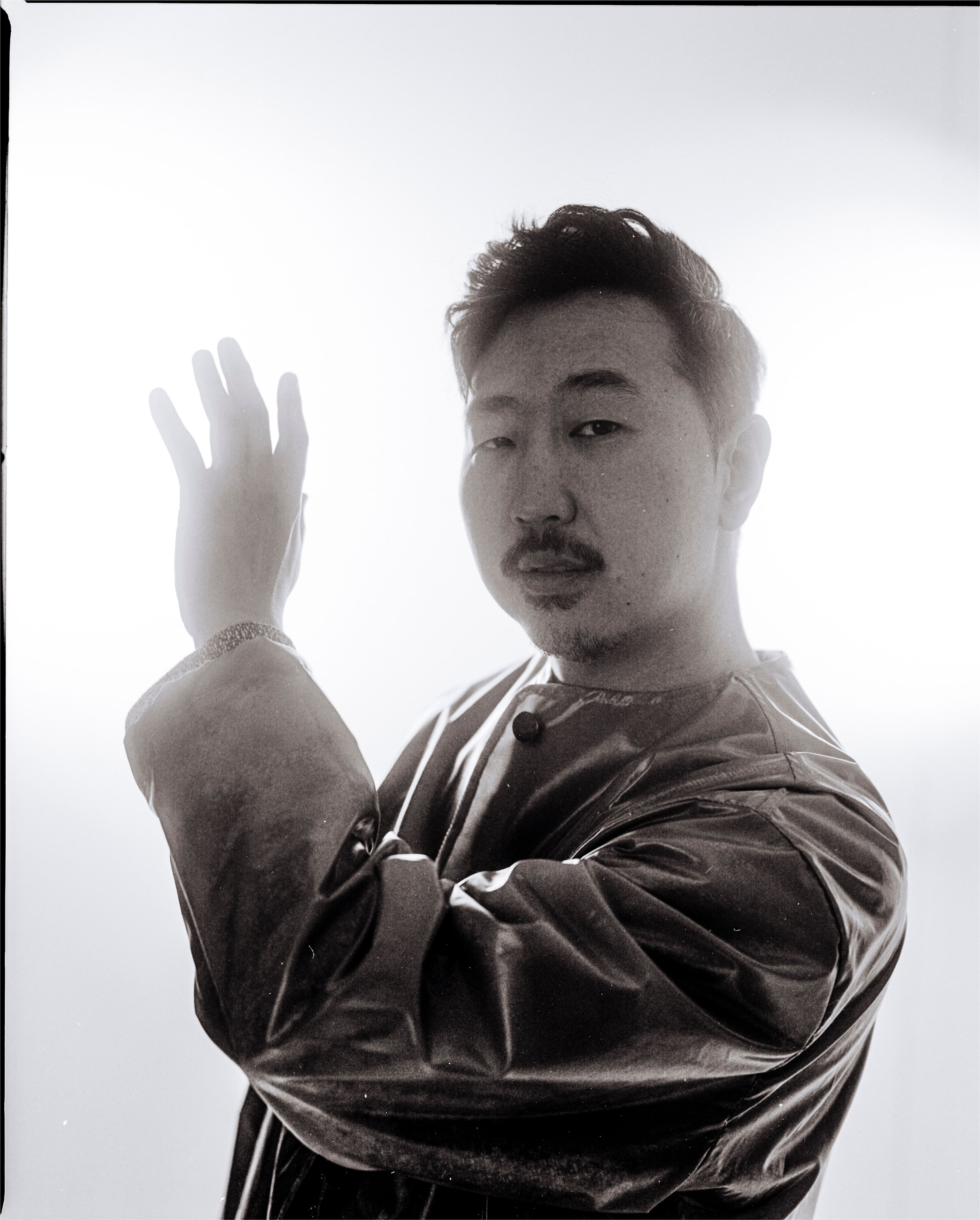
All CLOTHING by Clara Son
Injecting his personal life into his films is what has made Ahn successful as a filmmaker. It’s a calling card that started in college, when he realized that he couldn’t continue on the path of being a “good Korean boy” by becoming a doctor, and expanded into a double major in English while exploring his love of poetry and taking some film classes. “I really took to it. I think it was the first time I thought of myself as a creative,” he says. “My film projects were really bad at first. I wasn’t very good, and that made me want to try harder.” Soon, it became impossible not to notice where he was directing his time and energy. “I remember falling asleep for a biology exam, not being able to stay awake past midnight, cramming,” he explains. “But then for my film projects, I would go into the edit room after dinner, and then the next thing I knew, it was 8 AM. I thought, ‘Wow, I pulled an all-nighter.’ You have to trust that passion.”
Naturally, the next step was film school, where he found clarity in his voice. In his first year, he felt more comfortable writing film history papers than making films. “But in my second year, someone told me, well, you should write what you know,” he says, advice that changed everything. He wrote a personal short film called “Andy,” centered on a Korean-American family, that received national attention. His subsequent short film, “Dol (First Birthday),” premiered at Sundance and continued that exploration. “In that moment, it was very much about how my gay identity and my Korean-American identity didn’t necessarily fit together. It just gave me a real sense of purpose, and I understood how film was such a valuable medium to explore what’s going on in my life,” says Ahn. “That’s a process that I practiced on The Wedding Banquet, too. All my films, I feel like they came at a time in my life where I was actively chewing on the ideas of the movie in my own life. I hope that’s why it feels like my films all come from a similar point of view, because it’s just been my life that I’ve been kind of trusting.”
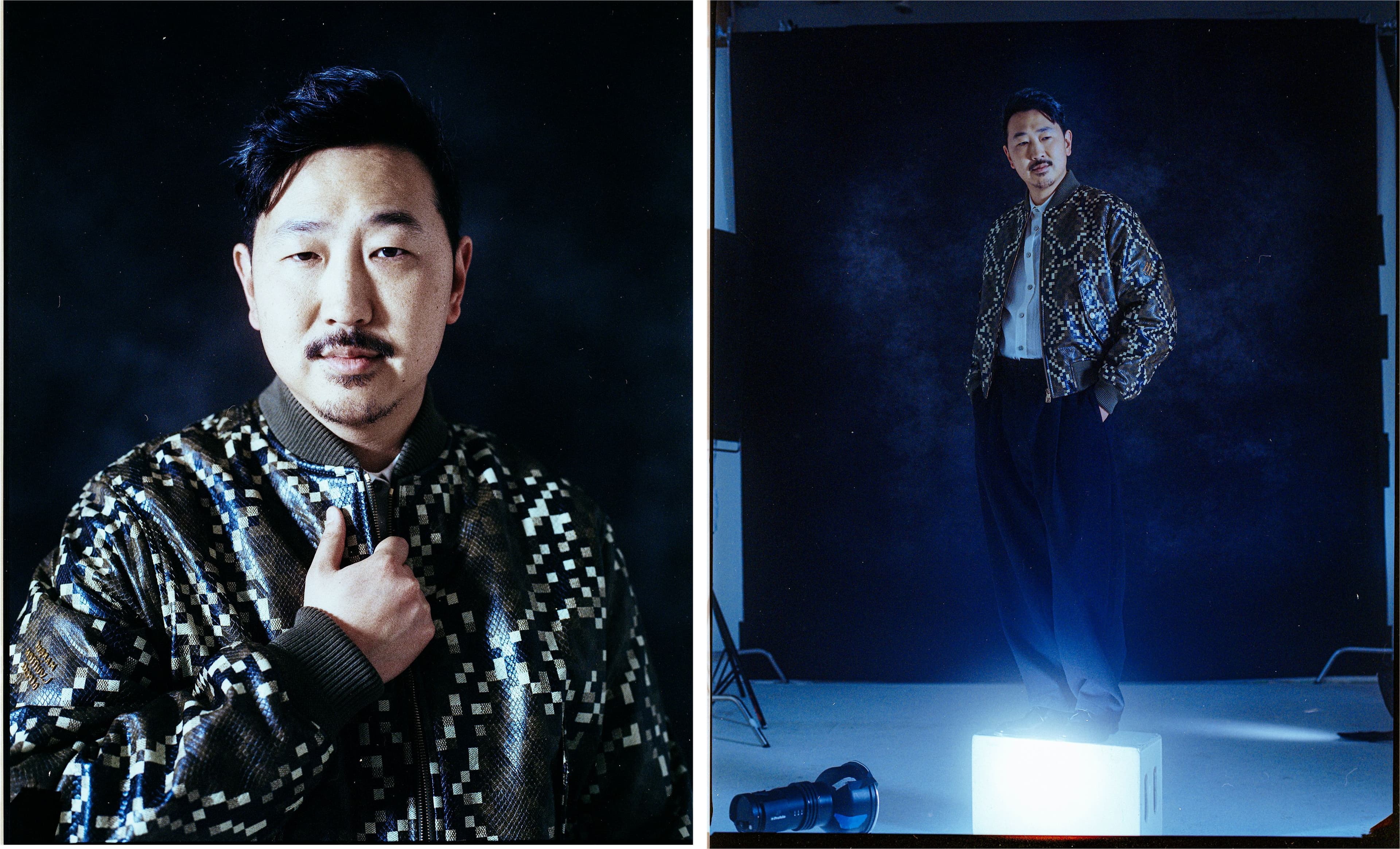
JACKET, SHIRT, and SHOES by Louis Vuitton. PANTS by The Frankie Shop.
From there, he again built on trusting in his voice and experience, leading to his acclaimed directorial debut, Spa Night, which took the intersection between gay and Korean identity further by grounding it in Koreatown, Los Angeles. After developing the script at the Sundance Screenwriters Lab, he raised money on Kickstarter to fund production. Although he had many ideas, he says this was the script that got the most traction. “As an artist in this medium, when people are interested in something, you keep pushing on it,” he says. “It’s such an expensive medium. Even a micro-budget feature film is probably hundreds of thousands of dollars. So you do have to be a bit of a business person. I really appreciated that people were really interested and excited about Spa Night.”
Having started firmly with a more dramatic tone, it’s interesting that Ahn is best known now for his romantic comedies. While still in pre-production on The Wedding Banquet, Ahn directed Hulu’s hit film Fire Island, a story inspired by Jane Austen’s Pride and Prejudice featuring a queer Asian-American main cast. The film was highly regarded as a beautiful portrayal of the theme of chosen family. “When I came out to my parents, I was living with them, and I packed a bag because I wasn’t sure how they would take it. I had a friend on standby,” says Ahn. “I just really value queer friendship and this feeling that they’ll accept you, that they see you for who you are. With family, fixed family, sometimes there are expectations of who you should be, right? And sometimes that can be really unfair. So there’s something about this ability to just define yourself by yourself and have your chosen family celebrate that.”
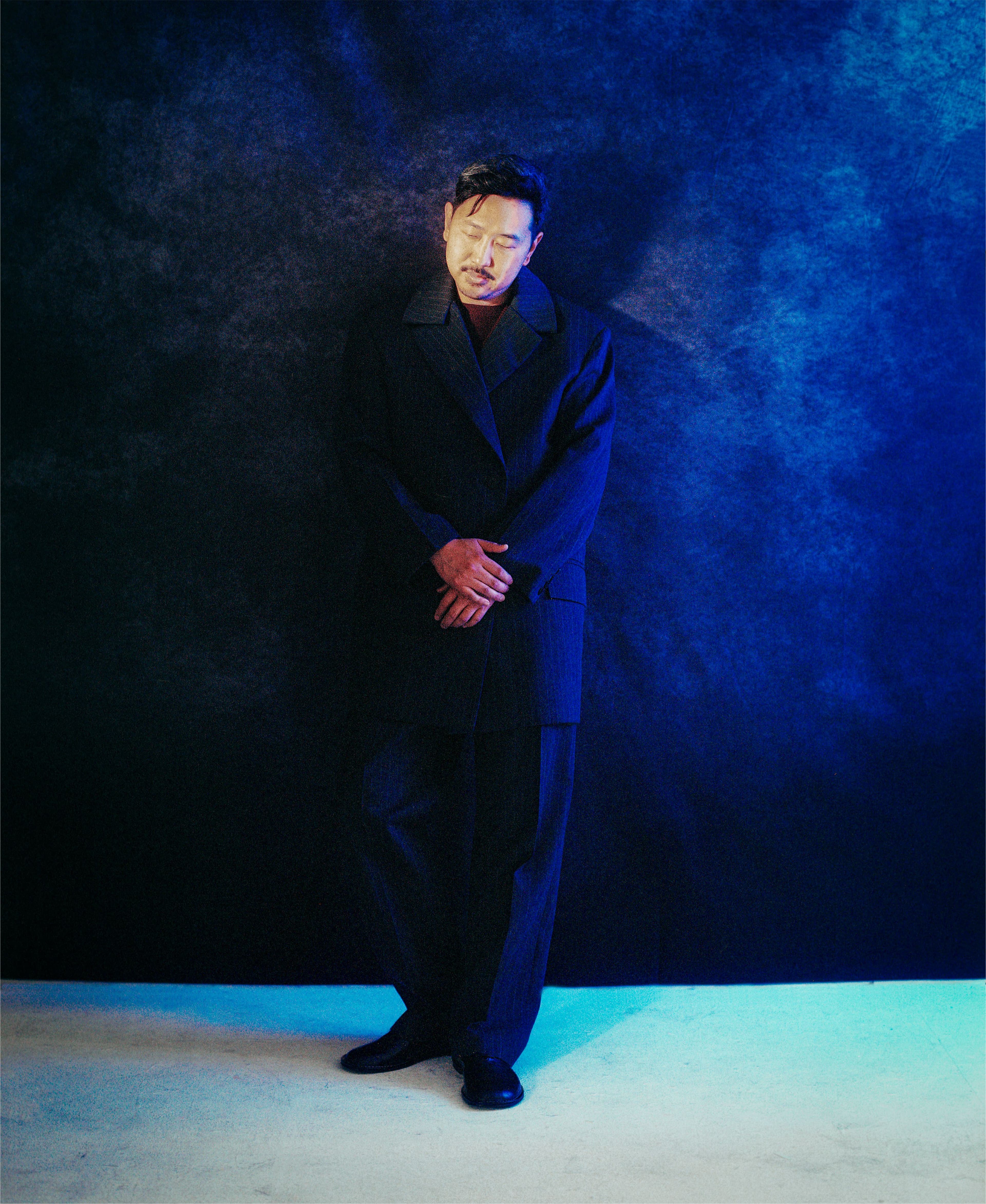
All CLOTHING by Ouer. SHOES by AMI Paris.
Ironically, Ahn believed he had said all he needed to about chosen family—until he found himself returning to it once again. “After Fire Island, I was like, ‘I don’t think I could talk about chosen family again.’ I had The Wedding Banquet in development even before Fire Island. I knew the script was about chosen family, but it wasn’t until we cast it and saw the ensemble together on screen that I was like, ‘Oh no, this is really about chosen family again,’” he says, laughing. “But that’s okay. I was really happy about that. I think that’s a subject that I’m always going to come back to in my career.”
When asked what he thinks a reimagining of The Wedding Banquet might look like in another twenty-two years, he shakes his head and says he doesn’t know. “I will say this—I would be so honored if someone wanted to reimagine a work of mine. As artists, we have to not just acknowledge but celebrate the fact that we inspire other people, and that we are inspired by other people. It’s a legacy. You can’t take yourself out of that history,” says Ahn. “So because I admire filmmakers, I have to be ready, as much as I might feel weird about it, also potentially to be admired, and then take that seriously. It’s why I do a lot of mentorship.”
But Ahn is aware of how even this thought manifests in his work. “Not to get meta here, but The Wedding Banquet is so much about getting ready for the next generation. How do you strengthen the bonds of your current relationships to make room for new ones?” Ahn points out the theme of stewardship centered in the characters’ chosen occupations and pastimes as a social worker, a scientist, gardeners, artists, and a birder, and how it reflects in the film’s intention. “I hope this film can help create a more inclusive, safer, and more vulnerable space for other people to make their artwork,” he says. “I don’t want it to just be about the film. I hope it’s about the culture the film can cultivate and allow for.”
The Wedding Banquet is now playing in theaters.
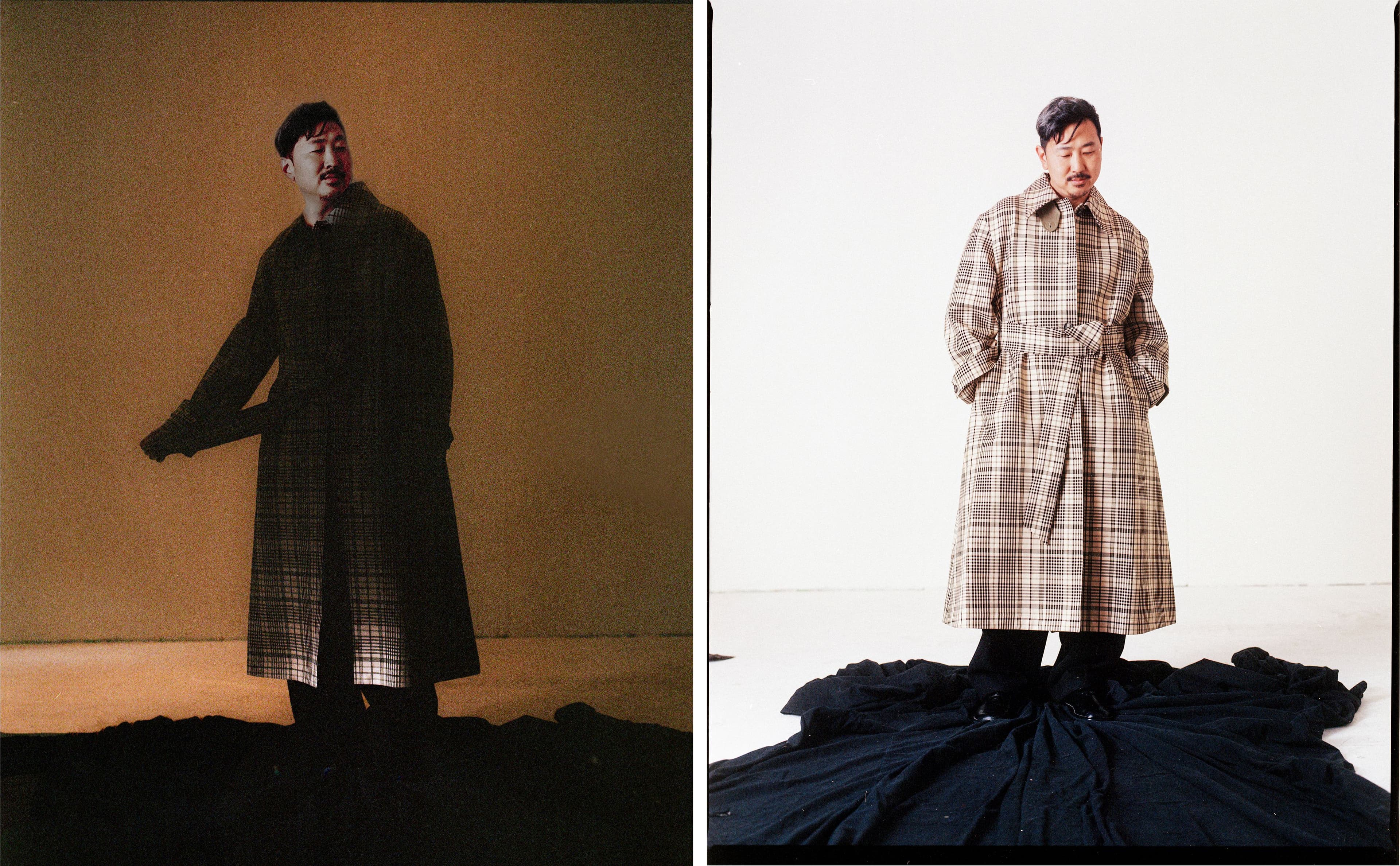
COAT and SHOES by AMI Paris. PANTS by The Frankie Shop.
As a nonprofit arts and culture publication dedicated to educating, inspiring, and uplifting creatives, Cero Magazine depends on your donations to create stories like these. Please support our work here.






